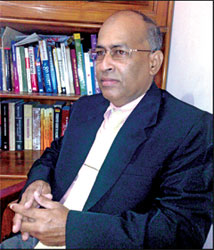Corporate Tax Administration Budget proposals - 2012
Dharmadasa Rangalle
In today’s business Community, Contributes more revenue through
paying taxes to respective government revenue agencies. Some tax
administrating agencies are regularly taking action to collect potential
revenue and maintain proper tax compliances. In Sri Lanka there are
three main revenue agencies engaged in the process of collecting revenue
for the government. They are Department of Inland Revenue (IRD),
Department of Custom and the Department of Excise.
|

Dharmadasa Rangalle |
Effectiveness of the any tax administration system are measured by
the degree of taxpayer compliance with tax laws, filling returns on due
date, paying taxes on due dates, reporting of correct amount of tax
payable, registering for payment taxes etc. However, it was revealed
that Income tax returns compliance of the past few years in Sri
Lankawere not in desired level.
President Mahinda Rajapaksa who also being the Minister of Finance
and Planning presenting budget proposals for 2013, in Parliament on
November 8, 2012 stated that, government introduced far reaching reforms
in the 2011 budget, towards a simplified and broad based tax regime in
our country, drawing special attention to small and medium scale
entrepreneurs through its tax proposals and accordingly several effected
taxes were removed. In budget speech, The President further stated, that
out of the 27645 businesses as in the Large Tax Payers Unit, only 11,101
Companies have a turnover above Rs. 10 million, which generate 97
percent of revenue from VAT and NBT, in addition to corporate Income
tax.
Since the Inland Revenue Department needs to pay greater attention to
corporate entities and intensify its tax audit activities, the
management of such large tax files will be brought under one
consolidated unit. History of LTU A number of tax administration in the
world have established special systems to administrator there large tax
payers. In 1950s and 1960s, several OECD Countries (Organization for
Economic Corporation and Development) introduced special tax audit
operations for large corporate.
A more recent trend specially in developing and transitional
countries is setting up full-fledged Large Tax Payer Unit that are
responsible for most tax administration functions relating to such tax
payers including tax collection, enforcement and tax audit. Beginning of
1980s, the IMF (International Monetary Fund) has recommended that member
countries facing revenue crisis and looking to strengthen tax
administration, to establish Large Tax Payer Units (LTUs) to increase
control over the largest tax payers and improve large tax payers tax
compliance in the short and medium term. Currently more than 40 OECD
members’ countries in their tax administrations have recognized the
importance of concept of LTUs and established LTUs.
Further more than 13 countries in Asian region have set up LTUs at
different periods and points of time. India, Bangladesh, Nepal, Thailand
are some of the countries among them. Our neighboring country India,
following the international practice, the Honorable Finance Minister in
his budget speech 2005-2006, announced the proposal to set up Large Tax
Payer Unit which would act as a single window facilitation center for
all large entities paying excise duty, corporate tax/income tax and
service tax.
International Experience
It is a proven fact that countries those are having LTUs in their tax
administration mechanism have gained significant benefits from
establishing special operation to control the compliance of largest tax
payers. It has also experienced, certain risks needed to be addressed.
Clearly, countries like Australia, France, The Netherlands, New
Zealand, United Kingdom, United States have shown that setting up
special operations to control large tax payer compliance has resulted
increased compliance and more effective tax administration overall.
Such tax administration mechanisms have focused tax administration to
test reforms later extended to the rest of tax payers.
The LTUs needs reforms and modernization in a consistent manner to
reach the deserved level of objects and to remain effective and to keep
up with changes in the economy and the tax payer population.
In setting up of a LTU to increase the administration efficiency of
tax collection and enforcement, it must meet certain minimum
requirements Such as a sound legal framework, clear and simpler criteria
for selecting large tax payers, standard and transparent procedures, the
administration of all the large tax payers by the LTU, the
administration of all national level domestic taxes. Proper reporting
system, effective LTU staff selecting and training, appropriate job
grading are also to be met in order to guarantee a smooth functioning of
the LTU. IRD - LTU
Department of Inland Revenue of Sri Lanka also has set up LTU to
strengthen its tax administration and this Unit was established in 1995
with 1000 large tax payers’ files, though the IMF recommended to
establish with 500 files since more than 70% of revenue was generated
from 500 large tax payers.
Now the number has increased to 1200 and accordingly 1200 larger tax
payers’ files are currently administered in LTU and generated more than
60% of the targeted total revenue from IRD. It is accepted facts and
research papers on this subject have been proved of the LTU is only
partly established, it will not reach its potentials to improve the
operations of the tax administration and increase large tax payer
compliance.
Non availability of LTU or it is not well functioning, that is not
only is an important opportunity for reform lost, but the LTU loses
credibility as a vehicle for modernizing tax administration. Considering
these facts, budget 2013, rightly focused to strengthen the LTU
expanding its scope in order to administer the 90% of the targeted
revenue through LTU. The fundamental purpose of taxation is raise
revenue through measures that suit for country’s circumstances and
administration capacity.
To line with such direction, establishing of fully-pledged well
designing consolidated large taxpayer unit in IRD is timely and rightly
decision taken to strengthen revenue administration in the country. |







